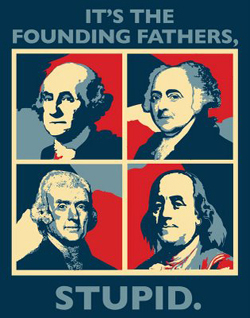 Two recent Op-Eds posted here on ‘Blog, or Die.’ dealt with what I consider to be fraudulent practices of teaching the American Revolution. The first took elementary academia to task for propagating the watered down and candy-coated version of American history that we are taught as children. The second took proponents of American-Exceptionalism to task for disseminating the woefully naïve and inflated American propaganda that we have come to expect at Tea Party conventions.
Two recent Op-Eds posted here on ‘Blog, or Die.’ dealt with what I consider to be fraudulent practices of teaching the American Revolution. The first took elementary academia to task for propagating the watered down and candy-coated version of American history that we are taught as children. The second took proponents of American-Exceptionalism to task for disseminating the woefully naïve and inflated American propaganda that we have come to expect at Tea Party conventions.
Both are full of agenda-driven biases and do little to aid in the understanding of our country’s history. They also reveal an antiquated perspective and sense of insecurity. (But if re-telling the same stories and wearing a big foam finger that says “We’re #1” is what helps some folks sleep at night, who am I to judge?)
Today I thought it might be interesting to see how the ‘other side’ teaches the American Revolution. The following excerpts are taken from online surveys presented to students and graduates from Canada and the United Kingdom. Some folks may be surprised to know that the American Revolution isn’t really on the radar of other countries, even the ones who participated in it.
BRITIAN: “It’s called the American War of Independence, and it’s one of the events that are studied as part of the Glorious Revolution of 1688 and the Jacobite Rebellion or the rise of the British Empire. It also crops up as part of the background to the French Revolution and subsequent Napoleonic Wars. To the British it was just one of the things that happen when the main event - fighting the French and forming the United Kingdom - was going down. At the time the British Empire was beginning to form and priorities were elsewhere. The Brits were fighting the Spanish, the French, various Sultans and Maharajas in India and trying to hold on to the Caribbean spice/slave trade at the time. So there was a whole lot going on. You have to realize it’s not an integral part of British history. Yes it shaped the British Empire in that it leads to a shift towards India and Africa, but for Britain it was the loss of some colonies rather than something fundamental. British history covers over 2,000 years if you start with the Romans, even in recent times two world wars that wrecked Europe and ruined the Empire were far more integral.”
IRELAND: “In my school in Northern Ireland it was mentioned in passing as precursor to the republic gaining independence. Although obviously many years apart 1776-1916 (1922). Apart from that and the famine/Irish emigration we learn very little about American history. My compulsory history at school consisted of, as far as I can remember; some monarchy, some holocaust stuff, some the women’s rights movement over here, the troubles in Ireland, and a bit on the American west, which we all agreed was a stupid choice of subject and resented for being pretty much totally disconnected from anything we wanted to learn about. I remember being pretty disdainful for most of what was on the syllabus actually now come to think of it.”
UNITED KINGDOM: “The problem for America is that as a “young” nation, it needs to nurture its own mythology to arrive at a sense of national identity. The winners almost always get to write the “definitive” version of events and the truth is often, if not always, ignored or suppressed. The American Revolution, as the birth pains of the new country, is a prime candidate for such mythology. A myth repeated for 200 years takes on the mantle of truth. They do portray the Americans as bad, but the Americans portray them as bad. Just like Germans portray the allies of WWI as bad and vice versa. Every war is portrayed differently in different countries.”
SCOTLAND: “In Scotland schools teach the wars with England and the highland clearances. Never learned much about English history until the point where we learn about the union. World War 1 and 2 are the other big topics. The American civil war, America in general and even England is not taught in History and if they did it would likely be a single lesson.”
CANADA: “We learn about it a little bit in Canada, but we focus on the British (Canadian) / French point of view. The War of 1812 is far more important to us. I’m curious why so many Americans think the War of 1812 was won by America. In Canada we are taught it was a tie. If you look at the Treaty of Ghent, all pre war borders would be reinstated, and no surrender by either side. The treaty was mainly struck because the reasons for the war no longer existed. The short of it was that Britain was at war with France (the Naploeonic War), and the U.S. was giving the French assistance. So the British put trade barriers on America. Soon America declared war, and the War of 1812 began. After the Napoleonic War ended Britain no longer needed to place trade sanctions on America. This is what led to the Treaty of Ghent.”
Updated: Monday, 12 December 2011 11:17 AM EST
Permalink | Share This Post





